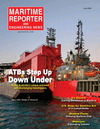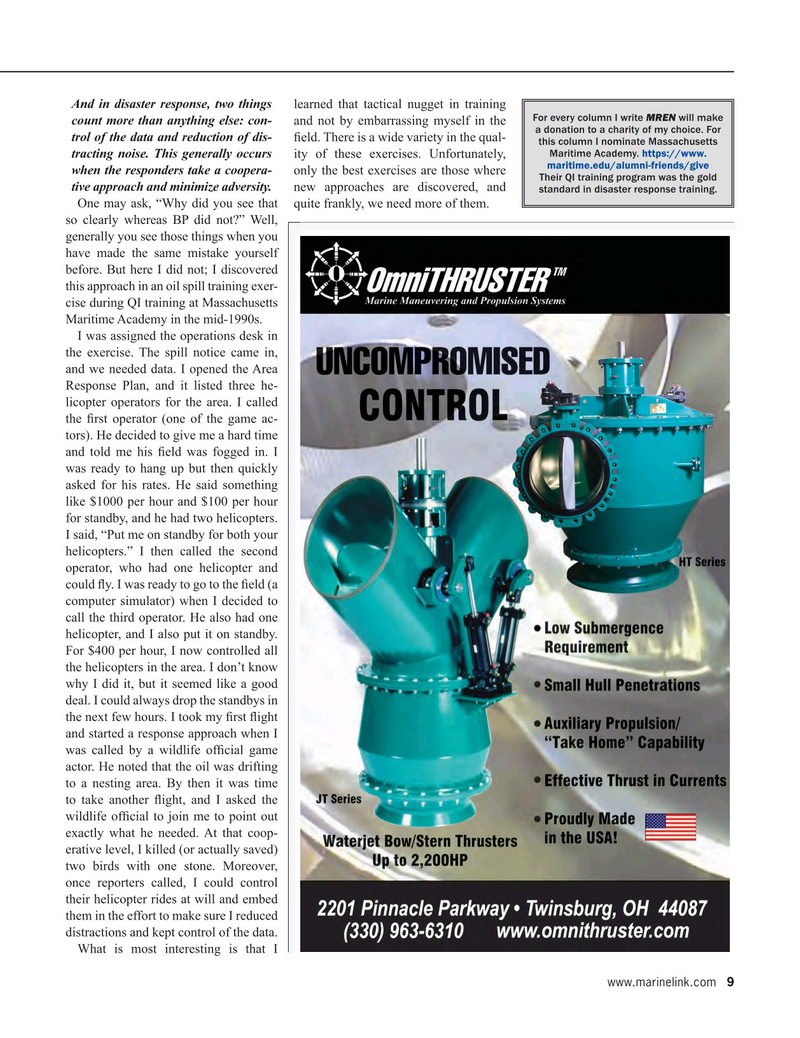
Page 9: of Maritime Reporter Magazine (June 2025)
Read this page in Pdf, Flash or Html5 edition of June 2025 Maritime Reporter Magazine
And in disaster response, two things learned that tactical nugget in training
For every column I write MREN will make count more than anything else: con- and not by embarrassing myself in the a donation to a charity of my choice. For trol of the data and reduction of dis- ? eld. There is a wide variety in the qual- this column I nominate Massachusetts
Maritime Academy. https://www.
tracting noise. This generally occurs ity of these exercises. Unfortunately, maritime.edu/alumni-friends/give when the responders take a coopera- only the best exercises are those where
Their QI training program was the gold tive approach and minimize adversity. new approaches are discovered, and standard in disaster response training.
One may ask, “Why did you see that quite frankly, we need more of them. so clearly whereas BP did not?” Well, generally you see those things when you have made the same mistake yourself before. But here I did not; I discovered this approach in an oil spill training exer- cise during QI training at Massachusetts
Maritime Academy in the mid-1990s.
I was assigned the operations desk in the exercise. The spill notice came in, and we needed data. I opened the Area
Response Plan, and it listed three he- licopter operators for the area. I called the ? rst operator (one of the game ac- tors). He decided to give me a hard time and told me his ? eld was fogged in. I was ready to hang up but then quickly asked for his rates. He said something like $1000 per hour and $100 per hour for standby, and he had two helicopters.
I said, “Put me on standby for both your helicopters.” I then called the second operator, who had one helicopter and could ? y. I was ready to go to the ? eld (a computer simulator) when I decided to call the third operator. He also had one helicopter, and I also put it on standby.
For $400 per hour, I now controlled all the helicopters in the area. I don’t know why I did it, but it seemed like a good deal. I could always drop the standbys in the next few hours. I took my ? rst ? ight and started a response approach when I was called by a wildlife of? cial game actor. He noted that the oil was drifting to a nesting area. By then it was time to take another ? ight, and I asked the wildlife of? cial to join me to point out exactly what he needed. At that coop- erative level, I killed (or actually saved) two birds with one stone. Moreover, once reporters called, I could control their helicopter rides at will and embed them in the effort to make sure I reduced distractions and kept control of the data.
What is most interesting is that I www.marinelink.com 9
MR #6 (1-17).indd 9 MR #6 (1-17).indd 9 5/31/2025 10:36:33 PM5/31/2025 10:36:33 PM

 8
8

 10
10
